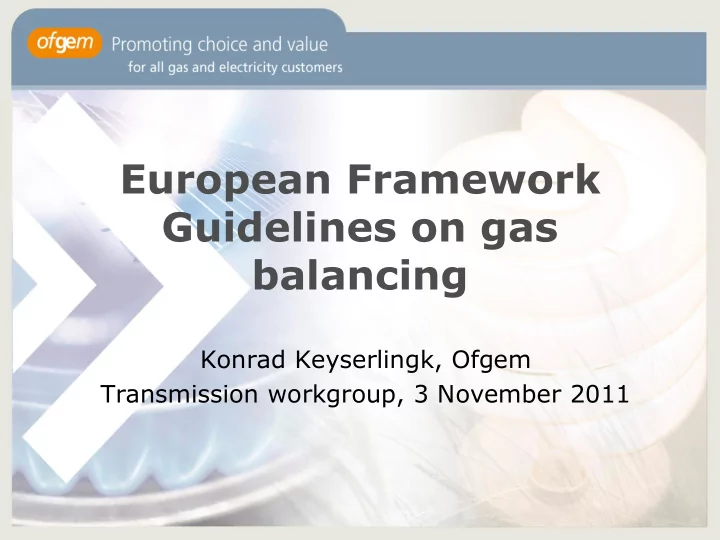

European Framework Guidelines on gas balancing Konrad Keyserlingk, Ofgem Transmission workgroup, 3 November 2011
Where are we now • 2010 to March 2011: ERGEG work on pilot FG 12 th April to 18 th October: ACER Framework Guideline • development • Stakeholder engagement : Expert Group, public workshops, consultation processes, bilateral meetings, discussions and informal written comment from EC • Next steps : – ENTSOG consultation on project plan – European Commission to initiate Network Code development process – Comitology 2
The vision Balancing regimes – key to market design (not just technical rules) Suitable for all parts of Europe Develop liquid traded market • Remove barriers to • Provides a coherent set Facilitating a single market cross-border trade of rules, which • Facilitate new entry by created by different ensuring balancing balancing arrangements arrangements are non- • lead to a common vision of discriminatory; balancing arrangements; • Reduce fragmentation of the market by looking at • Promote market liquidity • can be implemented in ways to merge balancing at emerging gas hubs network codes and is zones enforceable by NRAs; • by encouraging shipper • Promote the trading across timescales; • take account of the development of regional different degree of market markets by encouraging development across Europe • by having market the use of interconnectors (need for interim steps) arrangements for TSO (and gas from cross- procurement of balancing borders) in balancing gas 3
Problem identification • Lack of access to relevant information, flexible gas and network capacity reduces shippers’ ability to balance efficiently • Fragmentation of balancing zones may create barriers to cross-border trade • Some imbalance charges do not provide the right incentives to shippers and are potentially discriminatory • Non-market based methods for TSO procurement of balancing services reduce market liquidity • All of this results in TSOs doing most of the balancing instead of the market 4
Key elements of Framework Guideline • Network users to balance their portfolio, reduced role for TSOs • TSO to procure balancing services on the wholesale market as far as possible • Harmonised daily balancing period as far as possible • Information provision as much as is cost-effective 5
Public Consultation • 57 responses received • Generally very supportive (almost all responses complemented ACER on their document) • Most comments focused on detail • Responses and evaluation published on ACER website 6
Changes to FG as result of consultation • No wholesale change, but clarification of application of interim steps • Balancing platforms can also be used where locational and temporal products are not available on the wholesale market • Clarify criteria for within-day obligations and their approval process; need for sufficient information • Allows for more frequent information provision subject to cost-benefit analysis • Clarification of role of DSOs 7
Challenges for network code process • Purpose of “network code” is to flesh out the specific requirements in a form appropriate to pass Comitology and be annexed to Regulation • ENTSOG will have 12 months to deliver – Needs to be well organised and to access appropriate expertise • Engagement with DSOs will be important as well as other stakeholders GB stakeholder engagement has been very good, please keep this up! 8
9
Recommend
More recommend